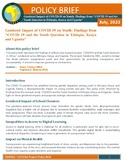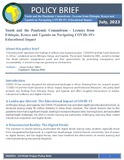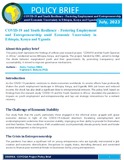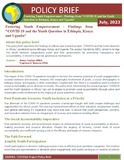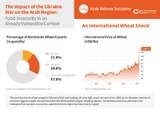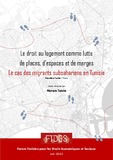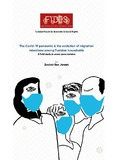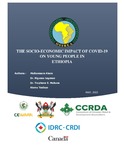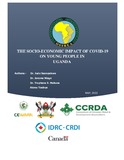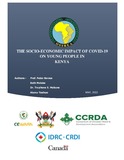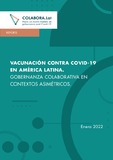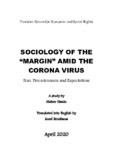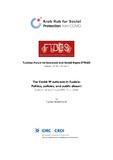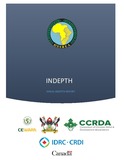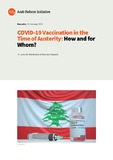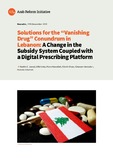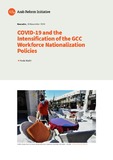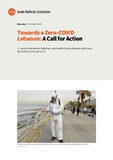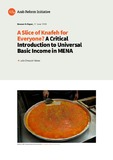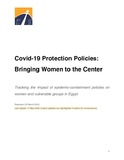Covid-19 Responses for Equity (CORE) - Promoting Democratic Governance - Accountability, Social Inclusion and Civil Engagement
Browse by
Recent Submissions
-
Gendered Impact of COVID-19 on Youth: Findings from "COVID 19 and the Youth Question in Ethiopia, Kenya and Uganda"
(OSSREA, 2023-07)This policy brief represents the findings of a three-year research project, "COVID19 and the Youth Question in Africa," conducted across Ethiopia, Kenya, and Uganda. The project, funded by IDRC, aimed to bridge the ... -
Youth and the Pandemic Conundrum - Lessons from Ethiopia, Kenya and Uganda on Navigating COVID-19's Educational Impact
(OSSREA, 2023-07)This policy brief represents the findings of a three-year research project, "COVID19 and the Youth Question in Africa," conducted across Ethiopia, Kenya, and Uganda. The project, funded by IDRC, aimed to bridge the ... -
COVID-19 and Youth Resilience - Fostering Employment and Entrepreneurship Amid Economic Uncertainty in Ethiopia, Kenya and Uganda
(OSSREA, 2023-07)This policy brief represents the findings of a three-year research project, "COVID19 and the Youth Question in Africa," conducted across Ethiopia, Kenya, and Uganda. The project, funded by IDRC, aimed to bridge the ... -
Fostering Youth Empowerment - Findings from "COVID 19 and the Youth Question in Ethiopia, Kenya and Uganda"
(OSRREA, 2023-07)This policy brief represents the findings of a three-year research project, "COVID19 and the Youth Question in Africa," conducted across Ethiopia, Kenya, and Uganda. The project, funded by IDRC, aimed to bridge the ... -
The Impact of the Ukraine War on the Arab Region: Food Insecurity in an Already Vulnerable Context
(Arab Reform Initiative, 2022)The Ukraine war is causing a surge in the price of wheat and food essentials and a shortage in these commodities worldwide. These infographics illustrate the impact of this war on the Arab region in terms of increasing ... -
Le droit au logement comme lutte de places, d’espaces et de marges Le cas des migrants subsahariens en Tunisie
(Tunisian Forum for Economic and Social Rights (FTDES), 2022-06)Rattaché au principe de la dignité, avoir droit à un logement signifie protéger la dignité et l’intégrité physique et psychique de l’individu. Ce droit implique l’accès àun logement sécurisé, habitable, doté de services ... -
The Covid-19 Pandemic and the Evolution of Migration Intentions Among Tunisian Households
(Tunisian Forum for Economic and Social Rights (FTDES), 2021-12)This study grew out of theoretical and field inquiries, to which we do not intend to give an answer, but rather increase the reflection on. As concerns the liberating civic identity of this study and human rights background, ... -
The Socio-Economic Impact of Covid-19 on Young People in Ethiopia
(OSSREA, 2022-05)The immediate requirement to tolerate in times of COVID-19 are troublingly low in Ethiopia. The larger segment of the population lives on a daily starving income level. A sizable portion of the population struggles with ... -
The Socio-Economic Impact of Covid-19 on Young People in Uganda
(OSSREA, 2022-05)This study delved into three questions: 1) How did COVID19 affect the social and economic lives of youths and their communities? 2) What explains the effects of COVID19 on youths and their communities? 3) What lessons ... -
The Socio-Economic Impact of Covid-19 on Young People in Kenya
(OSSREA, 2022-05)This report gives an overview of the qualitative analysis of key informant interviews (KIIs) and focus group discussions (FGDS) that were conducted with youths, opinion leaders, local administration, political representatives ... -
Vacunación contra COVID-19 en América Latina. Gobernanza colaborativa en contextos asimétricos
(Colabora.Lat, 2022-01-05)Este documento tiene como objetivo analizar el proceso de gobernanza vinculado a las campañas de vacunación contra el covid-19 en América Latina. Específicamente, busca dilucidar y poner en evidencia los procesos de ... -
Sociology of the “Margin” Amid the Coronavirus
(Tunisian Forum for Economic and Social Rights (FTDES), 2020-04-13)Humanity has never faced its tragic reality as it is the case these days. This time, the enemy is not a world war with its frightful casualties, economic and financial crises with their dreadful legacies, nor it is a ... -
The COVID-19 Outbreak in Tunisia: Politics, Policies, and Public Dissent
(Tunisian Forum for Economic and Social Rights (FTDES), 2021-07-06)This paper reviews state and non-state responses to the Covid-19 pandemic in Tunisia from March 2020 to March 2021. It offers a context-based narrative of the country’s key political and socio-economic features throughout ... -
Kenya INDEPTH Report
(OSSREA, 2021)Report on Covid-19 in Kenya, includes chapters on: Community Engagements and Action Towards Covid-19 Response in Kenya; Empirical Researches and Studies Conducted on Covid-19 in Kenya; Stakeholders and Partnership Levels ... -
COVID-19 Vaccination in the Time of Austerity: How and for Whom?
(Arab Reform Initiative, 2021-01-15)As countries begin to roll out vaccination for COVID-19, the Lebanese caretaker government has yet to provide details about its vaccination strategy, raising concerns about its ability to provide vaccines due to the country’s ... -
Solutions for the “Vanishing Drug” Conundrum in Lebanon: A Change in the Subsidy System Coupled with a Digital Prescribing Platform
(Arab Reform Initiative, 2020-11-17)The shortage of foreign currency caused by the multiple crises in Lebanon threatens the availability of pharmaceutical products, with patients experiencing shortages of many drugs despite an importation subsidy system for ... -
COVID-19 and the Intensification of the GCC Workforce Nationalization Policies
(Arab Reform Initiative, 2020-11-10)Gulf Cooperation Council (GCC) governments have intensified their efforts to nationalize their workforce in response to the COVID-19 crisis and the resulting economic contraction. These policies will have a wide-ranging ... -
Towards a Zero-COVID Lebanon: A Call for Action
(Arab Reform Initiative, 2020-10-05)In its first report, the Independent Lebanese Committee for the Elimination of COVID-19, a group of concerned citizens with various health-related expertise, addresses weaknesses in current government policy and highlights ... -
A Slice of Knafeh for Everyone? A Critical Introduction to Universal Basic Income in MENA
(Arab Reform Initiative, 2020-06-12)The Covid-19 crisis is igniting interest in the concept of Universal Basic Income (UBI) in the Middle East and North Africa region, as policymakers, economists and activists grapple with deteriorating economies and major ... -
Covid-19 Protection Policies: Bringing Women to the Center
(Egyptian Initiative for Personal Rights, 2020-03-28)Tracking the impact of epidemic-containment policies on women and vulnerable groups in Egypt In times of major social crisis, a gendered and feminist perspective exposes the priorities and biases of public policy. It ...

